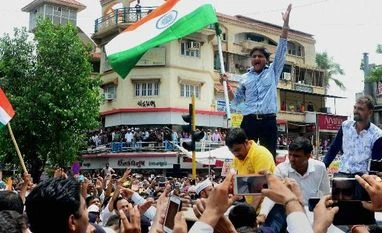The timing may not have been the most appropriate. But Rashtriya Swayamsevak Sangh (RSS) chief Mohan Bhagwat’s statement on reservation is reiteration of the organisation’s stand spelt out nearly 34 years ago. An RSS statement dating back to 1981 says “policy of reservation has, because of its wrong implementation, become a tool of power politics and election-tactics instead of serving the purpose for which it was framed.” It suggested constituting a committee of “non-partisan social thinkers” to look into the issue.
ALSO READ: Reserving jobs
If at all a committee of “non-partisan social thinkers” is constituted, it will be faced with growing demands from three dominant castes—Patidars, Marathas and Jats—to be included in the category of other backward classes (OBCs) so that they too can avail of the benefits of reservation in government jobs and admission into premier educational institutions.
Why are these groups, who vehemently opposed caste-based reservation in the 80s and the 90s, so desperate to be part of the quota system now? Perhaps out of the growing realisation that political domination alone does not automatically translate into overall development of members of the community.
The story of legislative politics in Maharashtra has been the story of complete dominance of the Marathas in the last five decades. Leaving aside seats reserved for scheduled castes and scheduled tribes, the community’s share in the state assembly has been close to the half way mark in all assemblies since 1962. The dominance got extended to sugar cooperatives, district cooperative banks and educational institutions.
While the Maratha political class kept adding to its sphere of influence, the large majority continued to suffer. Recent studies have shown that a fair majority of the Marathas still live in rural areas and continue to be dependent on agriculture. Not more than 5 per cent of them, however, own land in excess of 20 acres, a category which can be called rich farmers. The fragmentation of landholding (from an average size of 2.28 hectare for the country as a whole in 1970-71 to a mere 1.16 hectare in 2010-11) is the primary reason for this.
Also Read
What has added to the Marathas’ woes is the crisis in the sugar sector and plateauing of farm productivity across Maharashtra.
There is another factor at work prompting dominant castes to be included in the OBC category. That is ‘if they have, why not us’. It is especially true for Jats. The community has sizeable presence in Western Uttar Pradesh, Haryana, Punjab and Rajasthan. In fact, the community’s dominance in Haryana politics has been so complete that the recent appointment of a non-Jat chief minister after 18 years made news. But Jats too want reservation as the feeling is growing among them that, by once declining the offer of being part of the OBCs, they are losing out on opportunities compared to similar other castes.
Studies have shown that the feeling is not completely untrue. A recent report by a leading scholar in five districts of Western Uttar Pradesh found that Jats are not only trailing Yadavs and Gujjars (two castes of similar social standing) in government jobs, their representation in organised private sector jobs too is less than their perceived peers. As a result, on per capita income terms, Jats have lagged Yadavs and Gujjars.
ALSO READ: No need to reconsider reservation: Centre
What explains the sense of relative deprivation among the erstwhile well-off communities? The growing urban-rural divide? Data too suggest that in the first decade of this century, consumption expenditure of rural folks- both rich and poor- grew at a slower pace than their urban counterparts. And economists have argued that the gap has widened between the rural elite and the urban elite. It is now the turn of the rural elite—which is what these castes have been- to seek parity by demanding reservation.
The problem is if their demands are met, there will be a flurry of demands from other groups, dominant or otherwise.
)